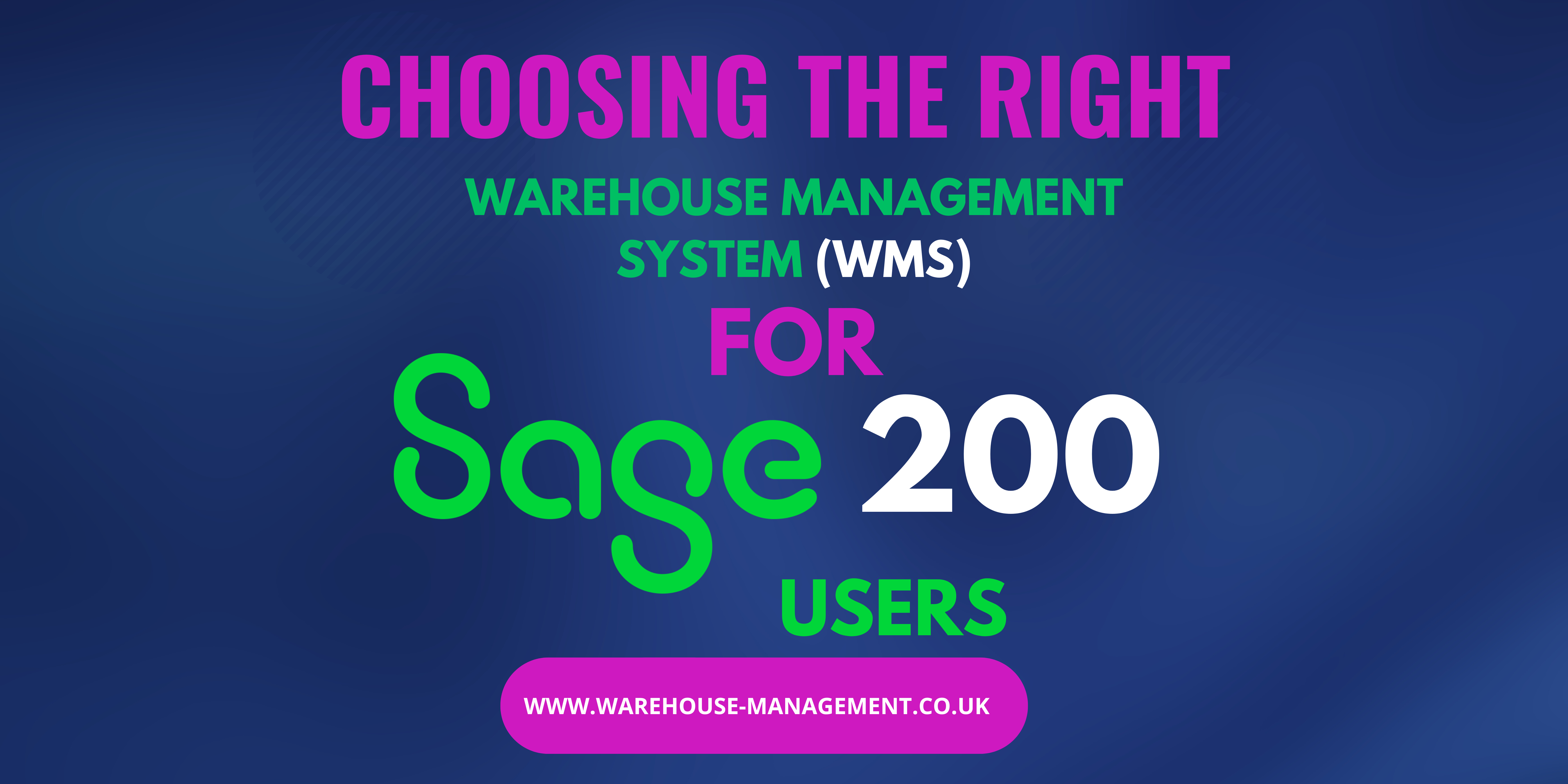
Having the right Warehouse Management System (WMS) is crucial for wholesale and distribution businesses, especially those utilizing Sage 200. Sage 200 is a popular accounting and business management solution known for its flexibility and scalability, making it a go-to choice for many medium-sized enterprises (SMEs). However, to maximize the benefits of Sage 200, integrating it with a compatible WMS becomes important. However, with a number of options available in the market, selecting the best fit can be difficult. In this blog, we'll look into the key considerations for Sage 200 companies when choosing a Warehouse Management System.
1. Integration Capabilities: The seamless integration between Sage 200 and the chosen WMS is paramount. The WMS should be able to integrate seamlessly with Sage 200 to facilitate real-time data exchange, ensuring accuracy and efficiency in inventory management. Look for WMS solutions that offer pre-built integrations or APIs specifically designed for Sage 200 Pro or Sage 200 Standard to minimize implementation time and costs.
2. Scalability: Business needs to develop over time, and the WMS should be able to grow alongside your enterprise. Sage 200 users should opt for a WMS that offers scalability to accommodate increasing inventory volumes and expanding operations without requiring a complete overhaul of the system. Scalability ensures long-term viability and helps future-proof your investment.
3. Customization Options: Every business has unique workflows and processes, and a one-size-fits-all approach may not suffice. Sage 200 users should choose a WMS that offers customization options to tailor the system according to their specific requirements. Whether it's custom fields, workflows, or reports, the ability to customize the WMS ensures that it aligns perfectly with your business needs.
4. User-Friendly Interface: An intuitive and user-friendly interface is essential for maximizing productivity and minimizing training time. Sage 200 users should look for a WMS with a user-friendly interface that is easy to navigate and requires minimal training for employees to become proficient. A visually appealing and intuitive interface enhances user adoption and contributes to overall efficiency.
5. Advanced Functionality: Beyond basic inventory management functionalities, Sage 200 users should seek a WMS that offers advanced features to streamline operations and optimise warehouse processes. This may include capabilities such as barcode scanning, serial/lot tracking, location management, picking optimization, and real-time analytics. Advanced functionality empowers businesses to enhance productivity, reduce errors, and make informed decisions.
6. Mobile Accessibility: In today's business environment, mobility is important. Sage 200 users should opt for a WMS that offers mobile accessibility, allowing warehouse staff to perform tasks such as receiving, picking, packing, and inventory management using handheld scanners. Mobile accessibility enables real-time updates and enhances flexibility by enabling warehouse operations from anywhere within the facility.
7. Support and Maintenance: Reliable support and maintenance are essential for ensuring smooth operation and addressing any issues promptly. Sage 200 users should choose a WMS vendor that offers comprehensive support services, including ongoing maintenance, software updates, and responsive customer support. Additionally, consider factors such as vendor reputation, customer reviews, and service-level agreements (SLAs) to assess the level of support provided. This is most often easy to deliver if the system is cloud-based. Cloud-based systems also reduce dependence on the business's internal IT infrastructure such as servers, so reducing initial hardware costs and ongoing maintenance costs.
8. Cost-effectiveness: While cost is undoubtedly a significant factor, Sage 200 users should prioritize value over price when selecting a WMS. Consider the total cost of ownership, including implementation costs, licensing fees, ongoing support, and potential ROI. Evaluate the features and functionalities offered by different WMS solutions against their respective costs to determine the best value proposition for your business.
Why Choose ES Consulting's Barcoder 250 Cloud WMS?
In the realm of Warehouse Management Systems (WMS), ES Consulting's Barcoder 250 Cloud stands out as a comprehensive solution that encompasses all the essential features discussed above. Here's why you should consider Barcoder 250 Cloud for your business:
1. Integration: Seamlessly connects with Sage 200 Pro and Sage 200 Standard, streamlining data exchange and improving inventory management accuracy.
2. Scalability: Grows alongside your business, easily adapting to increasing inventory and operational demands.
3. User-Friendly: Intuitive interface reduces training needs, boosting productivity and efficiency.
4. Advanced Features: Includes barcode scanning, serial/lot tracking, locations management, pallet management and analytics for optimized warehouse processes.
5. Mobile Access: Allows efficient task management via handheld mobile scanners such as the Zebra TC 21, enhancing agility and responsiveness.
6. Reliable Support: ES Consulting offers comprehensive support services, including maintenance and responsive customer assistance.
7. Cost-Effective: Despite robust features, remains cost-effective Warehouse Management System (WMS), delivering significant value and improving ROI over time.
In conclusion, ES Consulting's Barcoder 250 Cloud WMS offers a powerful yet simple solution for inventory management, ensuring efficient operations and seamless integration with Sage 200. Upgrade your warehouse management system today for enhanced control and productivity.